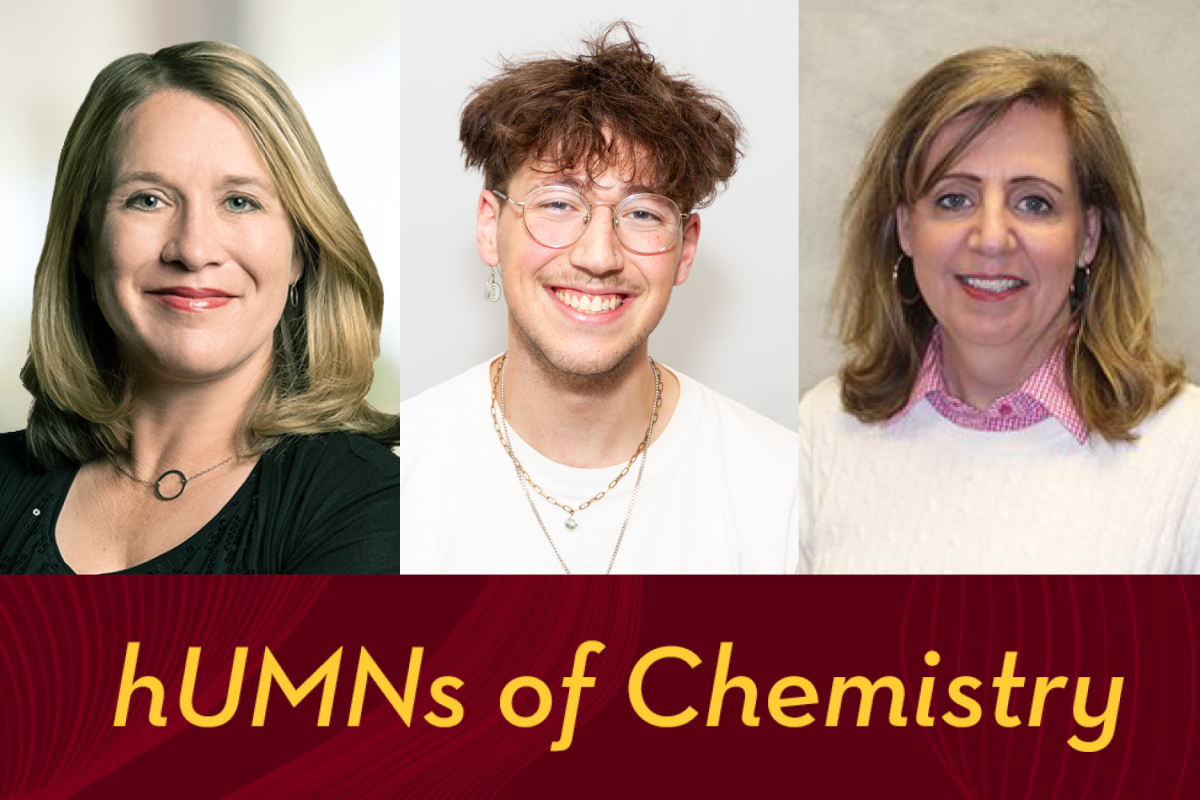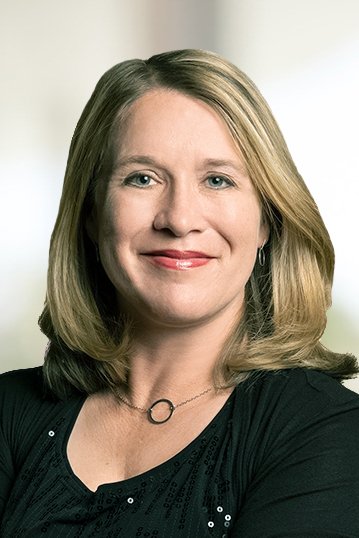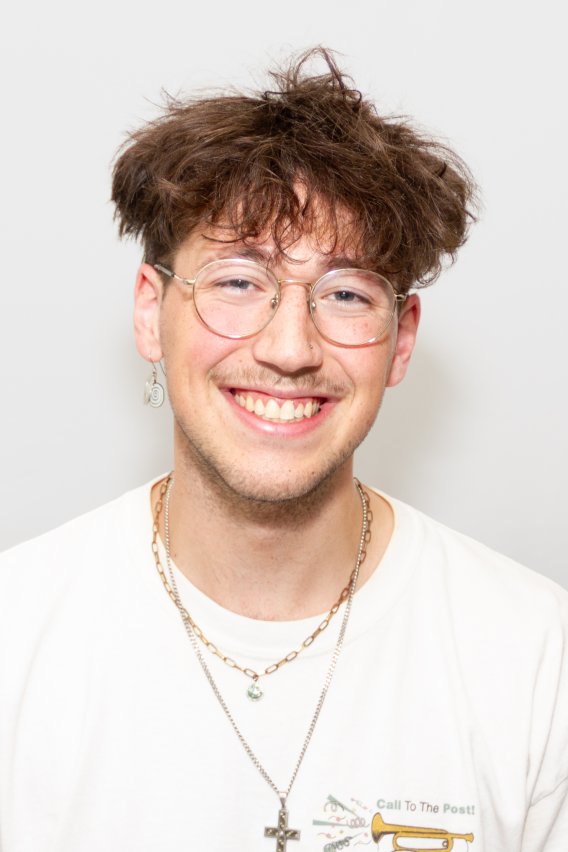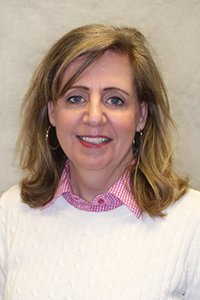hUMNs of Chemistry #15


Christy Haynes
She/her
Department Head and Distinguished McKnight University Professor
Tell us about your journey to the University of Minnesota.
I was hired as an assistant professor before I finished my PhD (I could hardly believe it!), did a brief post-doc, and then arrived to launch my research group in Summer 2005. While I was born and raised in Arizona, I had gone to college in St. Paul, so I already knew that I liked the Twin Cities as a place to live.
We would love to hear more about your research! What do you hope to accomplish with this work? What is the real-world impact for the average person?
My research group most often explores challenging analytical or nanomaterials projects in applied areas like sensing, agriculture, biology, or medicine. Our research goal is develop new materials and methods to take on important challenges like sensing pathogenic bacteria, remediating PFAS pollution, and improve agriculture yields.
What courses do you teach? What can students expect to get out of your course?
Right now, I'm not teaching anything because being Department Head is a time-consuming job. I've enjoyed teaching general chemistry, graduate-level analytical spectroscopy, and freshman seminars (one about science in dystopian literature and another about designing TED talks).
What do you hope to contribute to the chemistry community at the University?
Great science done by great people! As a large, urban public university in a department that serves so many people, we have a great opportunity to promote detailed technical education and research while combatting anti-science sentiments among the voting public.
When you visit other universities, what do you love to share about our UMN community?
I love to talk about the amazing community that we share, the high level of collaboration and multidisciplinarity, the student leadership, and all of the great things about living in the Twin Cities.
Tell us about an important mentor in your academic life?
My PhD advisor, Rick Van Duyne, was an important academic mentor. He treated me like a partner in my graduate research, making it possible for me to present in high-profile venues, write proposals, and mentor junior researchers. He had faith in my potential long before (and much more unconditionally than) I did. Rick was a real scientific visionary - always full of big ideas and not intimidated by technical challenges. Unfortunately, he passed away in 2019; I wish my current group members had the opportunity to know him.
Tell us about an important mentee in your academic life?
Goodness, that is a difficult question to answer because there are so many. I feel like you could ask me this question about any generation of my research group, and I'd have a compelling answer. For the sake of brevity, I'll pick just one: Becky Rodriguez. Becky was in my group from 2016-2021, and she did some impressive work developing sensors for toxins. What influenced me even more than Becky's science was her resilience and her clear focus on why (and for who) she was doing her PhD. Becky was also tireless in her advocacy for others and invested in her doctoral work with her whole heart.
What do you do outside of the classroom/lab/office for fun?
I'm an engaged parent to two busy kids, I like to travel, and I can often be found jogging or walking the lakes in Southwest Minneapolis.
What’s your favorite piece of chemistry/science pop culture media? Why do you love it?
I'm a big Kurt Vonnegut fan, so, even though it brings about the end of the world, I have to say "ice-nine."
What was your very first job?
Beyond babysitting, I was a bank teller from the time I was 16-19.
Where is your favorite spot in the Twin Cities?
The Lake Harriet walking trail
Tell us about who makes up your household (including pets).
My spouse and I have two kids, a 12-year-old and a 16-year-old, and we have an unintentional rescue dog named Gia.
Are there any family or cultural traditions you want to share with our community?
My family always played a lot of board games and cards. I would love to have a regular card club to play euchre, sheepshead, and samba.
What non-chemistry interest or activity might surprise department members?
Not sure if it would surprise people or not, but I have a thing for TED and TED talks. I've been to several of the events in person (amazing!) and even rented a hotel room in the Twin Cities once for several days to watch the live stream uninterrupted. I enjoy deconstructing the talks I love most to figure out how and why they grab me and inspire me.

Parker Staub
He/Him/His or They/Them/Theirs
2nd Year Graduate Student
Tell us about your journey to the University of Minnesota.
Before living here, I grew up in a small Civil War town in Pennsylvania called Gettysburg and spent my entire childhood there. Gettysburg is supposed to be one of the most haunted places in the United States (because there was that one really big 3 day battle there like 200 years ago), but I never saw any ghosts or anything, which was disappointing :( From there, I moved west to attend the University of Pittsburgh, where I initially intended to work towards becoming a physical therapist. I quickly realized that I really didn't love the patient care field and then took organic chemistry, which was one of the best decisions of my life! I fell in love with chemistry, switched my major, and began working in the lab of Professor Yiming Wang. I studied the allylic C-H functionalization of simple alkenes and had a blast (and got published! Here's the DOI: https://doi.org/10.1002/anie.202216309.) Special shoutout to Yiming and my graduate student mentor Ruihan for being so supportive and helping foster my passion for chemistry.
We would love to hear more about your research interests! What do you hope to accomplish with this work? What is the real-world impact for the average person?
Broadly speaking, I work in the field of asymmetric catalysis for the synthesis of organic compounds. A good analogy for the importance of asymmetric catalysis in my opinion (and many others) is to think about hands. Imagine you need to shake someone's hand to seem all professional and stuff, and the person reaches out with their right hand. Unless you're feeling real silly and goofy, you'd want to also use your right hand to shake their hand since they fit together really well. Chemicals also have "handedness" and this is super important when thinking about designing medications to interact with specific parts of your body. Receptors can have parts of them that are either right or left handed, and if you put a left handed molecule in to bind with a right handed receptor, what you want to happen won't (and maybe something awful will happen, like with an old medication called thalidomide. Google at your own risk).
To be more specific, I am developing chiral (or "handed") organocatalysts that can reversibly bind with chemicals through existing groups in them, and mediate metal catalyzed reactions. The organocatalysts are called transient directing groups. This is really important because oftentimes in order for metal catalyzed reactions to occur, something irreversibly bound to the chemical compound is required to mediate such processes efficiently, which limits the scope of these reactions. In simpler terms, you can't make certain compounds because they need something stuck on them. Transient directing groups aren't stuck on your molecule after the reaction. Research is going good right now too so stay tuned for a publication (hopefully) in the near future to learn some more!
Are you involved in any student groups? What inspired you to get involved?
Last year I was involved with the DEI committee and was a part of the community building working group! I am super passionate about equity in science and making people feel welcome in general. I love connecting with others and making people from everywhere feel safe. I think being able to talk and work with people from across the world is a beautiful thing and makes us better (science agrees with me so I'm right). I'm hoping to be more involved with DEI initiatives in the future; I got a little busy during preliminary exam season.
What advice do you have for incoming chemistry students?
I'm going to try to keep this short and simple:
1. Make sure you love chemistry. Definitely will need this to get through the harder times of graduate school.
2. Find someone (or many people) to work for/with who makes you feel supported, motivated, and seen. Again, the harder times of graduate school are much easier with this.
3. Find something else to do outside of chemistry! Burnout is real and spooky, go touch grass or be a nerd about something else.
Tell us about an important mentor in your academic life?
My current advisor, Professor Chris Douglas (I just call him Chris FYI) has been a phenomenal PI in my first two years of graduate school. I struggle with anxiety and depression which can be exacerbated in STEM fields since failure is a regular experience. Chris has made me feel extremely safe and empowered to try things and has supported me in reframing failure. We work together on difficult problems that arise during research, and I feel respected, competent, and most importantly, not alone. I can talk with him about my anxieties and concerns and know that I will be supported and understood. Additionally, I appreciate that I don't have to hide my queerness at work or in front of Chris, which is always a small fear in the back of my head. I can't thank Chris enough for letting me work in his group :)
What are your plans after graduation?
I am leaning towards working at a Primarily Undergraduate Institution (PUI) as a professor! I've had a lot of fun teaching (I love people, I know I said that before but I'll say it again) and I think I'm pretty good at it too. I also like that I can do research at the same time with maybe a little less stress than in an R1 setting. I would also enjoy moving to Europe for a postdoc before launching a more "permanent" career.
What do you hope to contribute to the chemistry community at the University?
I hope that I can be seen as a friendly person to say hi to, or to help make others feel comfortable. I also want to be a mentor for younger graduate students to ask advice from. I've received great advice and support from a number of older graduate students from aroun the department and I want to pay it forward!
What’s your favorite piece of chemistry/science pop culture media? Why do you love it?
I love Professor Andre Isaacs. He is such a slay. (@drdre4000 on instagram)
What do you do outside of the classroom/lab/office for fun?
So much! I boulder (when my fingers aren't injured), bike (when it's not cold), play piano, listen to a lot of music, cook, snowboard, and more!
What non-chemistry interest or activity of yours might surprise department members?
I've been learning some gymnastics over the last few months and can now almost do a backflip off of solid ground!
Where is your favorite spot in the Twin Cities?
lake of the isles. I love biking around lake of the isles.
Tell us about who makes up your household (including pets).
Me and my lil plants :) I also have a plush panda named bozo whom I love and adore.
Are there any family or cultural traditions you want to share with our community?
If you ever go to southern Netherlands, make sure to get Zoerfleis. I have a bunch of Dutch family and they put me onto Zoerfleis - it tastes like a warm hug from grandma :)

Stephanie Stathopoulos
She/her
Assistant to the DGS and DUGS, Campus Mom
Please give a brief description of your role within the UMN Chemistry department.
I started in the department in 1986 working with our majors. In 2004 I was asked to add Graduate Recruiting to my duties. We became the first department to review graduate applications online. When the internet was just beginning I designed our first web pages. For several years I taught a one credit course on Chemistry Careers. I have 3-5 years left and I plan to focus on alumni relations and bringing their career information to a website that can help our students navigate their careers. I also want to ensure our majors are getting the advanced lab opportunities that fit those careers.
Tell us about your journey to the University of Minnesota.
I started as a student here in 1981 and changed my major three times. I ended up with a BS degree in education.
What professional successes are most important to you?
I was in four of our student's weddings and I am godmother to one of their kids.
What do you hope to contribute to the chemistry community at the University?
A warm and welcoming atmosphere for our students is my number one priority. (Of course a few faculty over my time here have found you don't have to be a student for me to listen/care.) Those relationships have paid off - I have connected with over 500 former students on LinkedIn and they are coming back to help our students.
What was your very first job?
Mowing lawns
What do you do outside of the classroom/lab/office for fun?
Since October of 2022 I have been dating a structural engineer and having the time of my life! We go to a lot of concerts and breweries (we even brew beers together - our first was a clone of Futon's Lonely Blond - we called it "Not So Lonely Blond"). For my 60th birthday he surprised me and took me to Wolf Trap Park (the only National Park devoted to the performing arts) and we saw John Legend - AMAZING! We are going to Red Rocks this summer to see The Revivalist and Spoon and going up to Duluth for our annual trip to the "All Pints North" festival.
What non-chemistry interest or activity of yours might surprise department members?
Wednesday nights I work with a group of 13-14 year old girls at our church. It's great to be a part of their lives and watch them mature.
Where is your favorite spot in the Twin Cities?
First Avenue - just saw Saint Motel there.
Tell us about who makes up your household (including pets).
Currently my 24 year old daughter Julia lives with me along with our dog Bella (a 13 year old Beagle Jack Russell). My son James (26) works for Charles Schwab and lives in Alabama with his girlfriend who is going to law school there.